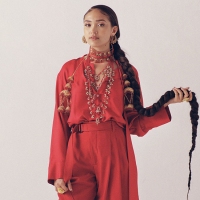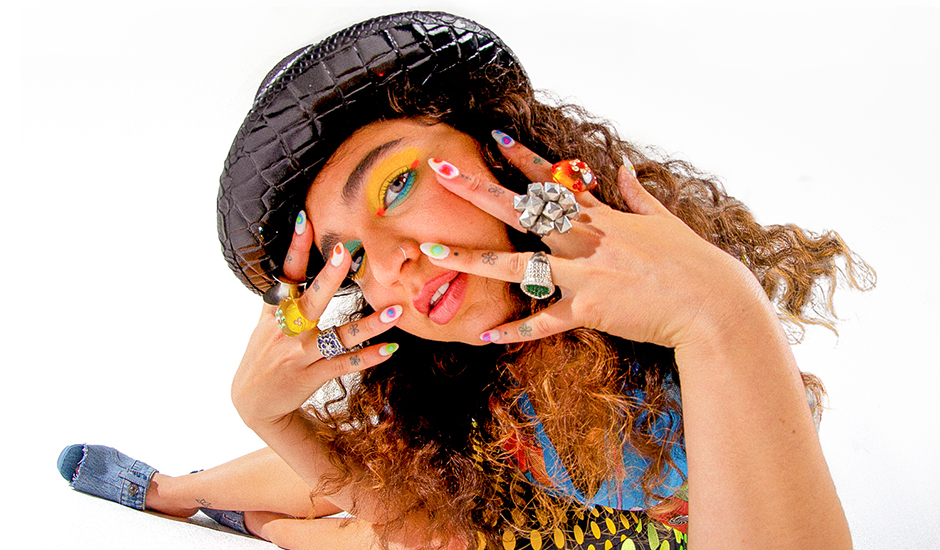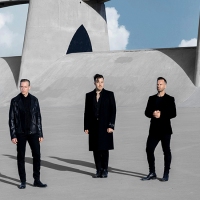 Joy Crookes isn’t going to play it safe: “I’m going to be bold.”On her debut album Skin, the South London musician creates a captivatingly powerful listen on personal and artistic identity.
Joy Crookes isn’t going to play it safe: “I’m going to be bold.”On her debut album Skin, the South London musician creates a captivatingly powerful listen on personal and artistic identity.

Year of the Wolf: Inside Remi Wolf’s wild, yet withdrawn world
The Californian musician’s debut album Juno is one of 2021’s most electrifying - and most intimate - pop albums.
Header image by Alma Rosaz.
There's something so naturally enticing about music that uses an energetic production or an addictive chorus to conceal unexpected themes. Foster The People's Pumped Up Kicks is a notorious example (everyone remembers finding out that indie's defining hit of the 2010s was actually about homicide and teenage gun violence), but it's a method of songwriting that's aided the rise of everyone from Billie Eilish (bellyache) to Stella Donnelly (Old Man); dynamic or happy-go-lucky melodies hiding darker, unexpected lyrical themes that lurk underneath.
It's a songwriting style that's been quick to define the evolution of Remi Wolf as a breakthrough artist of modern-day, genre-blending pop. Since her introductory debut EP You're A Dog! in 2019, the Californian musician has emerged as a cultural welder of sorts, melting together sounds and textures to create colourful, yet inwards-facing voyages through music's boldest and most boundary-pushing sounds. Her breakthrough single Photo ID became synonymous with music's internet-born, genre-fusing next generation, and the EP that followed it - last year's I'm Allergic To Dogs! - was a collection of tracks that encapsulated the same energy, full of joyful bursts of musical colour that would rattle around your brain in weeks.
In saying that, that intimate edge to Remi Wolf's music isn't so overtly obvious. Often, her vocals make even less conventional sense than the flashy punk-pop production it dances amongst; a prominent example being Quiet On Set, a highlight from her recently released debut album Juno which features lines such as "eating my ass like the human centipede" and "what's better than two girls, two cups" within the same verse, delivered with such a care-free conviction that it sounds like no big deal at all.
If you go beyond those viral-destined lyrics, however, you'll find Juno's more personal and intimate edge, and those lyrics that don't seem to make any sense at all, are actually some of the most upfront within a pop album this year. Juno takes this idea of hidden lyricism to an entirely new level, disguising battles with alcoholism and mental health through funk-ridden pops of colour that feel like a rush of energetic euphoria - even if they come from much heavier, darker places than they seem.
"Most of the time singing wasn't a direct expression of what I was actually feeling, but it's an expression," she told The Guardian in an interview earlier this year. "Singing is like screaming, getting shit out."
Arriving last week, Juno is 40 minutes of Remi Wolf "getting shit out", barrelling through a multitude of themes at a pace that reflects the chaotic approach to the album's production. There are songs about loneliness and isolation disguised amongst lyrical riffs shouting out Red Hot Chili Peppers frontman Anthony Kiedis ("I love my family intrinsically, like Anthony Kiedis," she sings) and UFC champion Conor McGregor ("this still feels like a Conor McGregor fight, kicking out my front tooth"), while Street You Live On is one of the many songs across Juno that reflects on the complexities of a past relationship, with a level of intimate detail that reveals itself as Remi's sound is pulled back to its most subtle (most subtle for her, that is).
However, the much-discussed album-opener Liquor Store is perhaps the most clear-cut evidence of Remi Wolf's brilliance, as she opens up about her battle with alcoholism that became apparent as her career began to take off. It's perhaps the most unconventional pop song written about addiction, with buzzing synth rushing amongst lyrics that only occasionally are simple enough to see the theme that lurks underneath: "I got headaches on headaches on headaches all day, but the handshakes are chasing my troubles away," she sings, in one of those few moments.
"I have a lot of demons - anxiety, depression, all of that - but I feel like I'm a fun person to be around; it's like a balance," she tells me, speaking over Zoom from her home the day before Juno's arrival. "I think my music is really reflective of me and my personality - how I am in real life." It's a balance that makes itself known on Juno, as the multi-facetedness of Remi Wolf's psyche exposes itself amongst the flashing samples and glittery synth that takes centre stage.
However, there are no doubts that Juno is one of 2021's funnest pop albums, an album where every note - from the sharp zing of a guillotine sample to the baby-like speaking of Quiet On Set's last half-minute - seems just as manic as it is down-right brilliant. It's a spark of pure joy, yet not afraid to be aware of their darker nature looming underneath; a contrast that if Remi Wolf did indeed set out to write a debut album that was a true reflection of herself, paints her as a multi-dimensional, often-chaotic new arrival that does in fact have demons like everybody else.

You've been releasing music for a couple of years now. Was there anything that pushed you into starting an album, or did it just feel like the natural time?
It started happening quite naturally, but there was a flip probably in November/December of the pandemic, where I had been bouncing around from the Bay Area to Los Angeles, trying to find out where I was going to spend the rest of my quarantine. I ended up settling back in LA, and I made the conscious decision to really start writing. It just started flowing out of me, like I didn't have to force myself to do anything really except for just getting into the studio, you know?
Luckily, my friend Jared [Solomon] - who I pretty much executive produced the album with - had a studio, and we were able to just be together for months. It was basically me, him and my dog - months and months of writing and finishing this album. It probably took a total of like six months to put the whole thing together. It just felt very natural.
Did you come into the sessions like, "okay, we're going to start writing the album?"
I know already that I wanted to make an album. I mean, partially because it's what you do as an artist, and I was a little bit contractually obligated to make an album, and what are you going to do about that? But of course, I wanted to make an album. I had made two EPs already and it felt like it was time for the album. I didn't want to make another EP, I wanted to put together a substantial piece of work, and I had the time to do it.
I know debut albums can bring quite a learning curve. How did you find the experience?
It was… yeah. I learnt so much in making the album. I write my songs very quickly, and then we'll go back and be very detailed about the production and the flow and how the song feels. I'm very tuned into that stuff, and I had all the time in the world to be really detailed about it, so we really, really went in.
Emotionally though, it was a horrible time of my life. During the pandemic, I was lonely and I was just getting sober, so it was the most difficult emotional experience. I was also coming into my career at the same time, which was causing all of these weird schedule changes, and I started not trusting people and started feeling like I didn't have any friends, and it was honestly a lot. It was a lot to deal with mentally for me, and it got pretty rough. But luckily, as you can probably hear on the record, I wrote about a lot of that stuff, and you can hear me sorting through all of that on the album. It was really the only way that I was able to process anything, I think.
Thank god I had my dog and thank god I had Jared. Otherwise, I would have been psycho, psycho, psycho. I feel like I'm getting over that period now, though. I'm finally starting to find a little more control over that mental stuff as things have opened up over here in the US. I'm finding my footing a little bit more now.
It sounds like the album was a very crucial tool in processing all of this and breaking it all down.
Oh absolutely, that's what it's all about, right? That's what music is for.
On that, you're able to talk about some incredibly personal and intimate things on this album, but a lot of the time, you do it through abstract lyrics or fun production - there's this natural genuine joyfulness and happiness. Is this a way of songwriting you're really drawn to?
I think so, yeah. It's very natural that it comes out that way because I think I'm also that way in real life. I have a lot of demons if you will - anxiety, depression, all of that - but I feel like I'm fun to be around. It's a balance. I think my music is really reflective of me, my personality, and how I am in real life.
On top of that, though, I just love music that you can dance to and have fun with, and I want my shows to be really fun. I think I'm just drawn to that more moveable, upbeat sound in general, so it just makes its way in. My shows are fun now, and the energy... I think the music obviously plays an important part in that.

I know you've been asked about Liquor Store a lot, as it is probably one of the most striking points on the record that shows what you do the best. But is there any other moment on the album that you're particularly close to?
I feel like I'm very close to every song for so many different reasons. It's so hard to answer this question because I could give an answer for every song - I'm so proud of all of it. One of the songs that really changed me after making it was Front Tooth, which I wrote with Jared and Kenny Beats, and it was just a really great session. I don't know, I felt so creatively free the day that I wrote that song, and I feel like it's one of my most well-written songs because I expressed exactly how I was feeling that day and that week. I don't know if people understand what I'm expressing, but I'm so proud of it.
In reality, though, every single song on the record means so much to me. They're all super honest - every single one - and I think they're all just little capsules of what was going on in my life that day. They're little photos in time - in song form - which I love. It reminds me of where I was and where I am.
What do you feel like you learnt about yourself while creating this album?
That I need to socialise with people. I realised that I am very extroverted, and I need other people to make me feel better. If I'm alone too long - well, if anybody's alone too long - anyone would go crazy, but for me specifically, I love being around people that really see me, so I definitely learnt that lesson. I think I also just learnt that I could stick to my word and really finish something. Like, I finished an album! In the timeframe that I wanted to finish it! And I was honest! I was real! I think I proved to myself that I could actually do that. Hopefully, my work is just going to keep being honest and real.
How do you feel like this album shows your evolution sonically within the time since your last EP, which wasn't even too long ago?
We had a lot of time to really develop this album, and I think that shows in the edge to it. I think that's because it was a very edgy time of my life; I was on edge, and I think we incorporated that in the sounds that we used. I was also just belting my ass off - screaming - for a lot of it. On this whole album, I'm actually singing - not that I wasn't on my other ones - but I took it to different places on this album, and tried a lot of other vocal tones and attitudes, which I hadn't experimented with before. There's a lot of sound experimentation on this album.
To tie everything together, how do you feel like this album will inform what you do in the future, whether that be personally or musically?
I mean, there's so much that I have learnt. I think the number one thing that I've learnt is to not limit myself to anything and to always try new things, because that's how all of my music has been made so far. I don't want to stop growing artistically; I want to keep pushing myself to do something different. I want to do what's unexpected, and I've learnt that people respond to that really well. That's what I want to do.
Remi Wolf's debut album Juno is out now via Universal Music Australia.
 Joy Crookes isn’t going to play it safe: “I’m going to be bold.”On her debut album Skin, the South London musician creates a captivatingly powerful listen on personal and artistic identity.
Joy Crookes isn’t going to play it safe: “I’m going to be bold.”On her debut album Skin, the South London musician creates a captivatingly powerful listen on personal and artistic identity.
 After a period of reflection, RÜFÜS DU SOL emerge all grown upOn their fourth album Surrender, the Australian exports reflect on a turbulent few years filled with new life, new experiences and new sounds.
After a period of reflection, RÜFÜS DU SOL emerge all grown upOn their fourth album Surrender, the Australian exports reflect on a turbulent few years filled with new life, new experiences and new sounds.